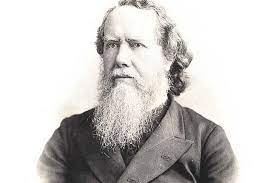The Urgency of Mission
After the young Hudson Taylor had returned on health grounds from his first tour in China, he studied medicine at the London hospital in Whitechapel. During this time he established the China Inland Mission (now known as OMF) and helped to translate the Bible into Chinese.
In September 1865, he attended at large Christian conference in Perth, Scotland and it was only with great difficulty that he had persuaded the organisers to give him a few minutes to speak on the dire spiritual needs of China.
“My dear sir,” the Convenor had exclaimed when speaking with this unknown Hudson Taylor, “surely you mistake the character of the Conference! These meetings are for spiritual edification.”
The missionary knew that the only key to spiritual edification lies in obedience to the Lord’s commands which include,
“Therefore go and make disciples of all nations . . .” Matthew 28:19
He knew that obedience is the evidence of a genuine love for Jesus (John 14:15, 21, 23). To Hudson Taylor obedience lies at the root of all true blessing.
The nervous young man stood before the vast audience and began with a simple prayer to his heavenly Father that revealed the intimacy he already had with his heavenly Father. He then began his talk by describing a journey he had made on a native junk from Shanghai to Ningpo. During the journey he had become friendly with a Chinese man, named Peter, who had spent some years in England. They got on well. Although Peter understood something of the Christian message he clearly knew nothing about its power to save.
On Friday October 10th 1856, they were approaching the city of Sung-kiang where Mr Taylor had planned to go ashore to preach and distribute some tracts. As he sat in his cabin he heard a splash and the cry ‘Man overboard!’ He rushed up to the deck and quickly discovered that it was Peter who was missing. He jumped into the water but could not find his new friend. He then noticed some local fishermen who had a drag-net and called on then to come and help,
“A man is drowning here.”
“It is not convenient,” came the reply.
“Don’t talk of convenience. Come quickly or it will be too late.”
“We are busy fishing.”
“Never mind your fishing, only come at once. I will pay you well!”
“How much will you give us?”
“Five dollars only don’t stand there talking. Save life without delay.”
“Too little!” they retorted, “We will not come for less that thirty dollars.”
“I haven’t got so much with me! I will give you all I’ve got”
“How much is that?”
“Oh I don’t know, about 14 dollars.”
The fishermen then came across with their drag net and on the first pass they brought up the missing man. However in spite of all their efforts to resuscitate him, life did not return. Those on board felt angry at the callous indifference and selfish behaviour of the fishermen who might easily have helped. It was felt that the fishermen were guilty of the man’s death because they could have saved him but did not do so.
As Hudson recounted this story he applied it to his listeners,
“Is the body then of so much more value than the soul. We say they were guilty of the man’s death because they could easily have saved him and did not do it.. but what of the millions whom we leave to perish, and that eternally. What of the plain command, “Therefore go and make disciples of all nations . . .”
Mr Taylor then shared a bible passage with his audience ,
“Rescue those who are being led away to death; hold back those staggering towards slaughter. If you say, ‘But we knew nothing of this,’ does not he who weighs the heart perceive it? Does not he who guards your life know it? Will he not repay each person according to what he has done?” Proverbs 24:11-12
The talk continued,
“While people are busy about other things, quite profitably occupied it may be, people are living and dying without God and without hope – a million a month in that one land, passing beyond our reach. . . Do you believe that each unit of these millions has an immortal soul and that, ‘Salvation is found in no one else, for there is no other name under heaven given to mankind by which we must be saved. (Acts 4:12)’ If so, think of the condition of these unsaved souls and examine yourself in the light of God to see whether you are doing your utmost to make him known.”
Mr Taylor then told of a conversation he had had with a Christian convert who had previously been a Buddhist leader. The convert asked him,
“How long have you known this good news in your country?”
“We have known it a long time, hundreds of years.”
“Hundreds of years, and you never came to tell us! My father sought the Truth, sought it long, and died without finding it. Oh why did you not come sooner?”
Surely sin should not be thought of as wrongdoing but, as James reminds us, it is a failure to do what is good (James 4:17). This is an old story but its message is very relevant to Christians in the west today.
BVP
Adapted from ‘Hudson Taylor and the China Inland Mission – The Growth of a Work of God’ by Dr and Mrs Howard Taylor.
